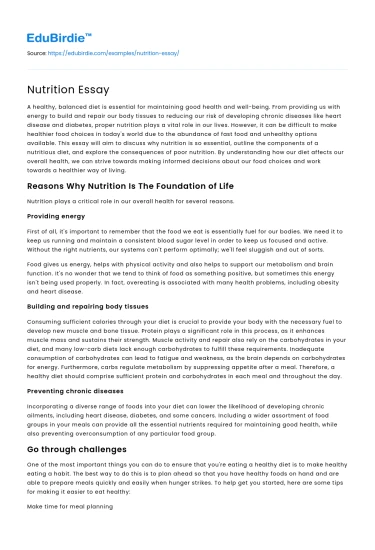A healthy, balanced diet is essential for maintaining good health and well-being. From providing us with energy to build and repair our body tissues to reducing our risk of developing chronic diseases like heart disease and diabetes, proper nutrition plays a vital role in our lives. However, it can be difficult to make healthier food choices in today's world due to the abundance of fast food and unhealthy options available. This essay will aim to discuss why nutrition is so essential, outline the components of a nutritious diet, and explore the consequences of poor nutrition. By understanding how our diet affects our overall health, we can strive towards making informed decisions about our food choices and work towards a healthier way of living.
Reasons Why Nutrition Is The Foundation of Life
Nutrition plays a critical role in our overall health for several reasons.
Save your time!
We can take care of your essay
- Proper editing and formatting
- Free revision, title page, and bibliography
- Flexible prices and money-back guarantee
Providing energy
First of all, it's important to remember that the food we eat is essentially fuel for our bodies. We need it to keep us running and maintain a consistent blood sugar level in order to keep us focused and active. Without the right nutrients, our systems can't perform optimally; we'll feel sluggish and out of sorts.
Food gives us energy, helps with physical activity and also helps to support our metabolism and brain function. It's no wonder that we tend to think of food as something positive, but sometimes this energy isn't being used properly. In fact, overeating is associated with many health problems, including obesity and heart disease.
Building and repairing body tissues
Consuming sufficient calories through your diet is crucial to provide your body with the necessary fuel to develop new muscle and bone tissue. Protein plays a significant role in this process, as it enhances muscle mass and sustains their strength. Muscle activity and repair also rely on the carbohydrates in your diet, and many low-carb diets lack enough carbohydrates to fulfill these requirements. Inadequate consumption of carbohydrates can lead to fatigue and weakness, as the brain depends on carbohydrates for energy. Furthermore, carbs regulate metabolism by suppressing appetite after a meal. Therefore, a healthy diet should comprise sufficient protein and carbohydrates in each meal and throughout the day.
Preventing chronic diseases
Incorporating a diverse range of foods into your diet can lower the likelihood of developing chronic ailments, including heart disease, diabetes, and some cancers. Including a wider assortment of food groups in your meals can provide all the essential nutrients required for maintaining good health, while also preventing overconsumption of any particular food group.
Go through challenges
One of the most important things you can do to ensure that you're eating a healthy diet is to make healthy eating a habit. The best way to do this is to plan ahead so that you have healthy foods on hand and are able to prepare meals quickly and easily when hunger strikes. To help get you started, here are some tips for making it easier to eat healthy:
Make time for meal planning. Planning your meals in advance will save you time when it comes to shopping and cooking. Not only that, but if you write down your meal plan (or create a spreadsheet or list in your phone), you'll be less likely to forget about it and make unhealthy choices because you'll know exactly what you need and where it is.
Plan ahead for easy preparation. If you know that an evening out is coming up, don't wait until the last minute to make plans for dinner. Create a menu ahead of time, buy the ingredients, and then have them ready in your refrigerator or pantry so that all you have to do is cook. Some people even find preparing their lunches the night before leaving for work helpful!
Conclusion
In conclusion, nutrition is a crucial component of maintaining a healthy lifestyle. Simply consuming unlimited quantities of any food is not sufficient for maintaining good health. It is necessary to consume a well-balanced diet that contains crucial nutrients like essential vitamins, minerals, and healthy meat sources (such as fish and chicken), as well as appropriate portions of fruits, vegetables, and whole grains. Reducing the intake of processed foods, and excessive sugar, and avoiding refined flours can also help optimise bodily function. Small alterations to everyday habits can make a significant difference in achieving optimal health.






 Stuck on your essay?
Stuck on your essay?

